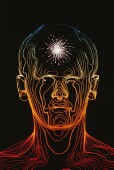
WEDNESDAY, Dec. 16 (HealthDay News) — Researchers have developed a tool to predict whether a patient will suffer a second stroke within 90 days of a first stroke.
“This is an important new tool because studies have shown that people who have a second stroke soon after a first stroke are more likely to die or have severe disability,” Dr. Hakan Ay, of Massachusetts General Hospital and Harvard Medical School, said in an American Academy of Neurology news release. “This tool can help doctors identify people who are at high risk of having another stroke and need immediate evaluation based on information typically available at the time of initial evaluation.”
The tool — called the Recurrence Risk Estimator at 90 Days score — uses brain scan results and a number of stroke risk factors to calculate a person’s chances of having another stroke within three months. The risk factors include history of transient ischemic attack (mini-stroke), age and type of first stroke. The higher a patient’s score, the greater their risk for a second stroke.
In a study of 1,458 ischemic stroke patients, Ay and colleagues found that those with four or more risk factors were about 40 times more likely to suffer a second stroke than those with no risk factors. The study also found that more than 96 percent of patients who had a second stroke showed signs of one or more risk factors.
Surprisingly, long-term predictors of stroke — such as smoking, diabetes and hypertension — didn’t predict short-term risk.
“We currently don’t have a well-developed tool for predicting short-term risk of early recurrent stroke, so this tool could help improve stroke care and outcome,” Ay said. “For example, people at high risk of a second stroke can be immediately admitted to specialized stroke centers and given preventive treatment.”
The tool’s accuracy still needs to be confirmed before it can be made available for general use, Ay said. The tool is described in an article published online Dec. 16 in the journal Neurology.
More information
The U.S. National Institute of Neurological Disorders and Stroke has more about stroke.

